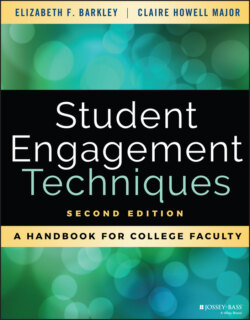Читать книгу Student Engagement Techniques - Elizabeth F. Barkley - Страница 38
Constructivism
ОглавлениеConstructivism suggests that individuals construct their own understanding and knowledge of the world. They learn through experience and their reflections on these experiences. Constructivism suggests that knowledge is not an absolute but rather is constructed by learners as they seek to understand their experiences (Driscoll, 2000). The learner is not a blank slate (tabula rasa) but instead brings experiences and cultural context to a situation. Learning is a personal endeavor in which internalized concepts, rules, and general principles are applied in a practical, real-world context. Constructivists, then, believe that knowledge resides in the mind and that learning is a change in an individual's internal reality as they interact with others in their environments, gathering information and filtering it so that it makes sense within their own, personal reality. Constructivists suggest that teachers facilitate learning by structuring and sequencing activities that emulate real-life experiences and that require the learner to take an active role in selecting, interpreting, and owning information from the learning environment. Constructivists tend to believe that:
Learning is the creation of meaning from experience.
Learning is an accumulation of experience, which changes with new experiences and new situations.
Learning has happened when a student completes an authentic task that has significance for the learner.
The teacher's main job is to facilitate learning rather than deliver information.
Students should be encouraged to discover principles for themselves.
Students should solve realistic problems.
Students should apply classroom knowledge in new contexts.
Students should be allowed—even encouraged—to engage in free exploration within a given framework or structure.
